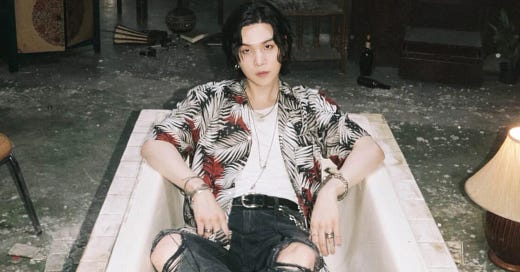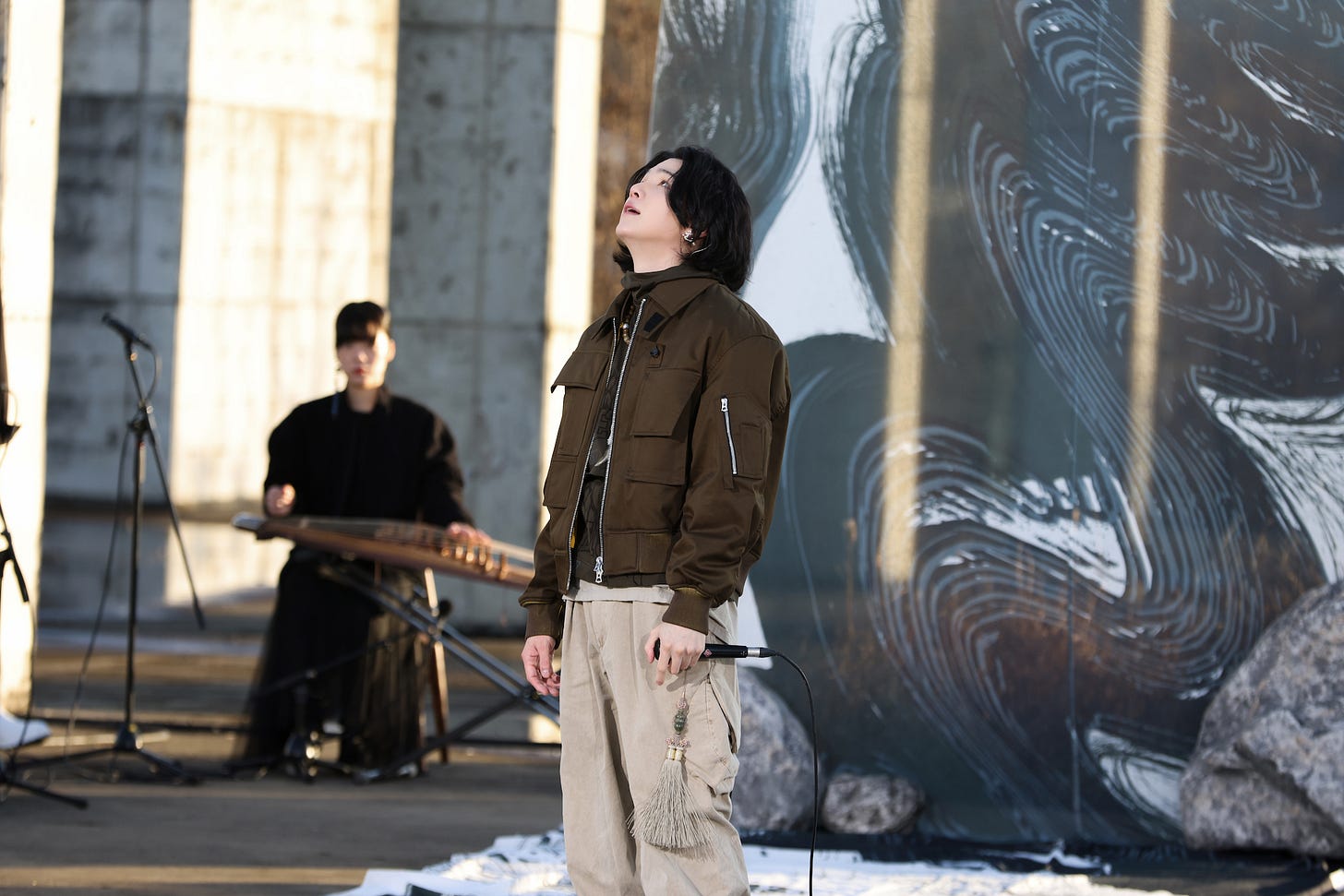Liberation, life lessons and mental health with Agust D's 'D-Day'
BTS rapper Suga lets us inside his darkest memories in debut studio solo album
(Photo credit: Big Hit Music)
The topic of mental health and pressure has come up a lot over the last week in the K-pop world. And as a fan, it’s hard not to get affected by it as well.
Idol-fan relationships have often been described as one-sided, with one person extending more emotional energy, interest and time towards celebrities despite the latter being unaware of the other’s existence. But the truth is, we often feel close to our idols because of how their music make us feel seen and heard. And while we truly don’t know what happens behind closed doors, getting a glimpse of a musician’s internal thoughts means the trust between fan and idol is strong.
Suga from BTS is no exception to this. As someone who’s often sang and rapped heavily on topics including mental health, loneliness and self-worth, there’s a reason why many have sought comfort in his words even when he’s speaking in a language different from ours.
Suga is among a rare number of K-pop idols who have openly called out the harsh competitiveness and pressure of being famous in East Asian society. In his Disney+ documentary Suga: Road to D-Day, Suga openly questions why the littlest things are often seen as “controversial” for idols. For instance, even actions like “smoking a cigarette in a video” is blown out of proportion. “I could never understand the mentality of these people,” he says.
Now with the release of his first studio album D-DAY under his moniker Agust D, Suga frees himself from many of his past negative feelings and instead forms a narrative on his own terms.
The end result is cathartic and liberating.
D-DAY is the final installment of his Agust D trilogy. His first two chapters, 2016’s Agust D and 2020’s D-2, both channeled the anger Suga felt in his own life and career, his complicated feelings about his rise to stardom and darker themes around self-hatred, obsession and depression. What makes D-DAY different however, is how Suga seems to have come to terms with the anger and resentment of his past. That’s not to say this album is a completely happy one. Instead, it feels as though he’s done a lot of healing to move on, and now wants to reach out to his past self.
We see this right off the top as the album begins with the intensely trappy “D-Day,” which features the lyrics “Future’s gonna be OK, OK, OK, look at the mirror and I see no pain.” As if he’s free from the whirlwind of his thoughts that were previously trapping him, Suga raps about “not wanting to be tied down to his past”, almost in a celebratory joyous mood.
He continues that theme with “Haegeum”, named after the traditional South Korean two-stringed fiddle. But the word “haegeum” is also applied when it is used in popular Korean vernacular, which means "lifting a ban and allowing something that is forbidden". Through this song, Suga pushes back on societal expectations and even asks the audience: “What is it, exactly, that's been restricting us?” He questions capitalism, hatred and prejudice. Perhaps all these things shroud us from truly feeling free in this world.
The album only begins to take a shift from heavy hip hop as we hit the fourth track “Amygdala”, a guitar-laden, somber song that showcases Suga’s vocal abilities. Named after the brain’s trauma processing center, “Amygdala” recalls various painful moments through his lifetime such as his mom’s heart surgery, an accident during his teen years that result in a shoulder injury and finding out about his father’s liver cancer. It’s an incredibly heavy song with an even tougher-to-watch accompanying music video. The video even deals with themes of self-harm, something that very much requires a content warning. It’s uncomfortable and triggering to watch. But at the same time, powerful to see Suga trying to reach out to his younger self to say everything is going to be okay.
During an interview K-pop singer IU (who also features on D-Day), Suga says “Amygdala” is one of the songs that he cherishes most. "It was a song where I accessed my unconscious mind to see why this person called Min Yoongi exists until now," Suga said, mentioning his birth name. "This was a song that sorted my thoughts out.”
(Photo credit: Disney+)
While “Amygdala” is undoubtedly one of my personal highlights, my favourite track on the album is actually “Snooze” featuring The Rose’s Woosung and the late Japanese pianist Ryuichi Sakamoto. In Suga: Road to D-Day, Suga actually gets a chance to meet with the iconic Sakamoto before his death. Suga adds that he wrote the song “Snooze” for aspiring young artists.
“I wanted this song to give them some strength. (Like to say) 'I know it's hard, but it's all gonna be okay',” he said.
“There are so many kids out there who are losing sleep, skipping meals and devoting themselves to music. And sometimes, some of those kids, who finally become musicians, they say to us 'I dreamed of being a musician because of you guys' some say 'Your music inspired me to become a musician' so this song is dedicated to those people."
(Photo credit: Disney+)
It’s powerful for Suga to say this, because it’s clear he’s saying what he wish he could have heard when he was younger. This is truly my favourite song off the album because it reminds you to keep dreaming. While the path will not always be easy, there are people like him who are cheering you on wherever you are.
It’s precisely why millions around the world have sought solace from Suga and BTS since their debut. I include myself among them.
To be quite honest, this past week has been incredibly sad and emotional in the K-pop world with the death of a beloved young idol gone too soon. I personally did not even want to write my weekly post because of how harsh the world can be sometimes. But as cheesy as it sounds, listening to D-DAY gave me a bit of renewed energy and hope that things CAN and WILL get better. I love “Snooze” for its hopeful message, and it’s precisely where I want to end off today.
Let’s fight harder for ourselves and the people we care about in this world. You matter, you’re loved and you’re worthy in this world.
If you are in pain and suffering, know that help is out there.
Remembering Moonbin
Like so many around the world, I was devastated to hear about the death of Moonbin last week, who was best known for being a member of the group ASTRO. I had listened to several ASTRO songs over the years, and very much enjoyed the sub-unit Moonbin&Sanha’s recent EP Incense from this past January.
Moonbin always stood out for his bright personality, beautiful smile, powerful vocals and dance moves. Whenever I saw him doing a dance challenge on TikTok, I would always say, “Wow, this man can really move!”
My heart absolutely breaks for Moonbin’s family, especially his sister Moon Sua, who is also a singer in the group Billlie. The two siblings often relied on each other for support. I recently saw a video of Moonbin winning a fan call with his sister soon after Billlie’s debut. It was truly heartwarming and you could just see how close they were. I’m also devastated for the members of ASTRO and all of Moonbin’s close friends, and I really hope they will get the proper time to grieve.
Over the last few days, I’ve been seeing so many funny and happy memories being shared about Moonbin online. I hope that everyone continues to focus on the joy he brought into the world.
And finally, please remember that you are not alone. If you are in pain and suffering, know that help is out there and you are loved. Take care of yourselves, and it’s completely okay to disconnect for a bit to process hard news and mourn.
Rest in peace Moonbin, may you keep shining in the stars forever.
If you are in need of help: Find a 24-hour crisis centre here in Canada
AUTHOR’S NOTE: Accountability is important to me, so please address corrections and concerns by sending me an email at bunnipopnewsletter@gmail.com. Continue the conversation by following Bunni Pop on Instagram and Twitter.








It's ironic how people are losing the courage to live in a world that's supposedly gotten much more inhabitable than it was half a century ago. Vulnerability is what makes us human. I feel like we forget that sometimes. We should be more embracive of ourselves and of others. Like Waymond says in Everything Everywhere All at Once: be kind.
I really appreciated your thoughtfulness here. I think what I love about Bangtan 2.0 is the realness. Pop music lends itself to the slick, and letting us skip the hard parts. BTS has never really shied away from the darker stuff, but even they had limits on their storytelling. They’re all telling it now, in solo stuff, in their own ways. It is beautiful in its pain.